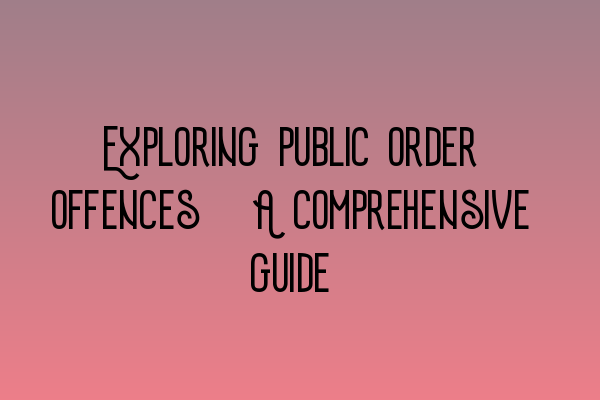Exploring public order offences: A comprehensive guide
Welcome to SQE Criminal Law & Practice Law UK! In this comprehensive guide, we will delve into the topic of public order offences, providing you with a thorough understanding of its legal implications. Whether you’re a student preparing for your SQE exams or a legal professional seeking to expand your knowledge, this guide has got you covered.
What are public order offences?
Public order offences refer to a range of criminal acts that disrupt or threaten public order and tranquility. These offenses typically occur in public spaces and can include behaviors such as public disturbances, disorderly conduct, harassment, offensive language, and violent acts.
Understanding public order offences is crucial for criminal law practitioners as they deal with cases related to public disturbances and public safety. Public order laws aim to balance the individual’s right to express themselves with the need to maintain social order and prevent harm to the public.
Types of public order offences
There are various types of public order offences, each with its own legal implications. Some of the commonly encountered public order offences include:
- Public disturbances: These offenses involve actions that cause fear, alarm, or distress to the public.
- Disorderly conduct: This includes engaging in disruptive or offensive behavior that disturbs the peace and order.
- Harassment: Harassment refers to unwanted behavior intended to intimidate, annoy, or alarm another person.
- Offensive language: Uttering offensive or abusive words in public spaces can lead to charges of offensive language.
- Violence: Acts of violence, ranging from minor altercations to more serious assaults, are considered public order offences.
Legal implications and penalties
Public order offences can have serious legal consequences. Depending on the severity of the offense, penalties can include fines, community service, restraining orders, or even imprisonment. It is essential to have a strong understanding of the relevant laws, guidelines, and legal precedents to effectively defend or prosecute public order offences.
If you’re preparing for your SQE exams, consider enrolling in our SQE 1 Preparation Courses and SQE 2 Preparation Courses to enhance your knowledge and boost your chances of success. Our expert tutors will guide you through the intricacies of criminal law, including public order offences.
Stay updated with the SRA SQE Exam Dates to ensure you’re well-prepared for your upcoming exams.
Conclusion
Public order offences are a significant aspect of criminal law, requiring a comprehensive understanding of the laws, precedents, and legal procedures involved. Whether you’re studying for your SQE exams or seeking to deepen your knowledge in criminal law practice, it is crucial to grasp the intricacies of public order offences. By familiarizing yourself with the types of public order offences, their legal implications, and the consequences they entail, you’ll be better equipped to navigate and excel in your legal career.
For further practice, take a look at our SQE 1 Practice Exam Questions and SQE 1 Practice Mocks FLK1 FLK2 to reinforce your knowledge and test your understanding of criminal law and practice.
We hope this comprehensive guide has shed light on public order offences and their legal implications. Remember, knowledge is power, and by delving into the intricacies of public order offences, you’ll become a more confident and competent legal professional.
